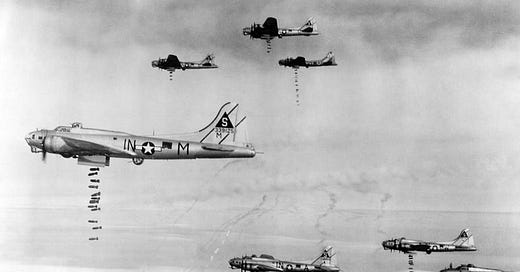The United States Air Force is the best in the business at scale. The Israelis are good but they don't have the full range of capabilities and volume that sets America apart from the pack. But even the Air Force can't provide its long-held objective of achieving victory through air power alone, with ground forces merely needed to mop up shattered enemies.
Bomb Damage Assessment or BDA has, for over a century, tried to determine how effective air strikes were. As the decades rolled by, those who depended on BDA were increasingly frustrated at the inability to get timely and accurate BDA reports. This has caused problems within air forces and with the ground forces being supported.
The U.S. Air Force has a well-deserved, and understandable, reputation for advocating military victory achieved mainly with air power. They still do, in spite of a historical record that will not cooperate. That said, the air force has some solid accomplishments to its credit. In some areas it has been extremely successful. This includes gaining since 1945 and maintaining ever since air supremacy wherever it operates.
Although I have noted (in Army magazine) that the rise of drones and vast improvements in air defenses has restricted the Air Force air supremacy to the blue skies, leaving troops vulnerable to air attack from the brown skies above the ground troops, which I think could be addressed by fighter drones (unless area shields are developed).
I wrote that the Balkans air wars in the 1990s didn't live up to the promise of air power purists. New advanced technology would finally make it possible! But it didn't.
But aha, you say, that's old tech! We've come a long way over the last three decades. This time for sure!
Sure, Russia is stinking up the blue skies with their primitive aerial hammer swung against Ukraine’s cities and frontline positions. But we'd do it differently! Which is true. And indeed, Israel smashed apart Hezbollah without a major ground war that went deep into Lebanon as I expected it would need to really win. That surely proves that we've reached a new era!
Well, not so fast, as I explored in this Substack essay considering if I am wrong in my air power belief. I think special circumstances led to the victory. It took a lot of Israeli planning and some inadvertent Hezbollah cooperation to inflict that aerial attrition on Hezbollah. Can that routinely be replicated? I doubt it.
And maybe, as I added in an update to the above Substack essay, the war in Gaza wasn’t exactly a success for victory through fires (including ground force raids), too. It is too soon to say if Israel achieved victory or just some relative quiet. Perhaps the same is true for Hezbollah.
And remember, too, that I do not think air power is worthless—although ground-based missiles, rockets, and long-range firepower might supplant aircraft in ground attack missions if we build a Black Box of Effects for ground troops to call in fires/effects. The main problem is that the Air Force doesn't want to provide close air support to ground units in contact with the enemy based on ground force requests for immediate help. The Air Force would rather follow a finally calibrated and calculated air campaign plan independent of panicky ground force requests for immediate Air Force attention that are probably a waste of sorties that merely subtract from the great plan to crush the enemy from the air.
So yeah, I still don't think we can get victory through air power alone—even using the hot, trendy drones that enthusiastic proponents claim can’t be stopped. They will become vulnerable to counter-measures. Just as pre-World War II theories that “the bomber will always get through” were falsified by better fighter aircraft, radar, air defense procedures, and massed anti-aircraft weapons. In World War II, if memory serves me, the casualty rates of American bomber crews rivaled that of infantry units.
NOTE: I assume that the picture I snagged online is from the Army Air Force.




